They all made a rush at her the moment she appeared, but Alice ran her hardest, and soon found herself in a thick wood.
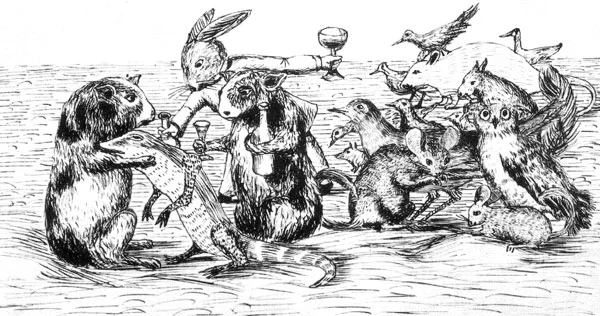
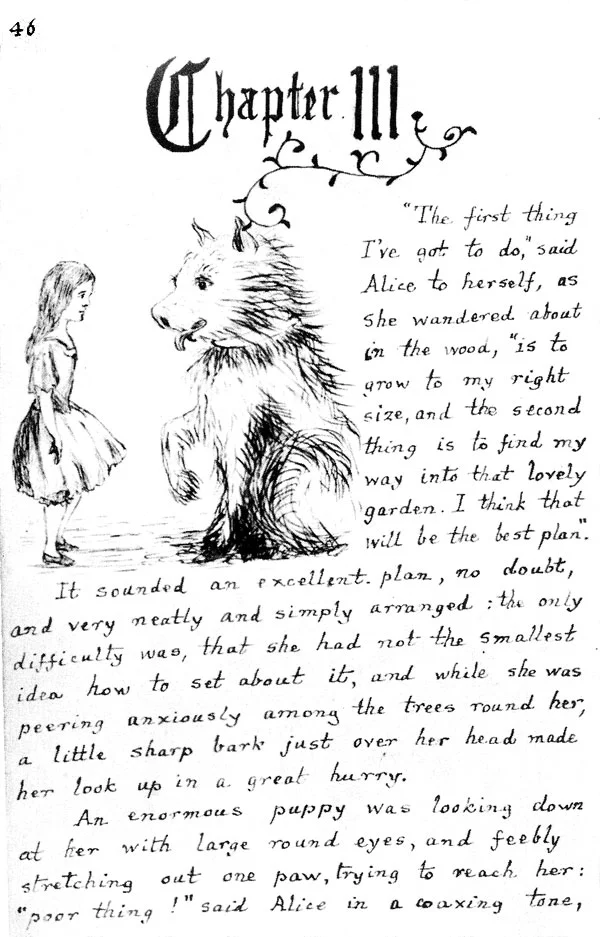
CHAPTER III
"The first thing I've got to do," said Alice to herself, as she wandered about in the wood, "is to grow to my right size, and the second thing is to find my way into that lovely garden. I think that will be the best plan."
It sounded an excellent plan, no doubt, and very neatly and simply arranged: the only difficulty was, that she had not the smallest idea how to set about it, and while she was peering anxiously among the trees round her, a little sharp bark just over her head made her look up in a great hurry.
An enormous puppy was looking down at her with large round eyes, and feebly stretching out one paw, trying to reach her: "poor thing!" said Alice in a coaxing tone, and she tried hard to whistle to it, but she was terribly alarmed all the while at the thought that it might be hungry, in which case it would probably devour her in spite of all her coaxing. Hardly knowing what she did, she picked up a little bit of stick, and held it out to the puppy: whereupon the puppy jumped into the air off all its feet at once, and with a yelp of delight rushed at the stick, and made believe to worry it then Alice dodged behind a great thistle to keep herself from being run over, and, the moment she appeared at the other side, the puppy made another dart at the stick, and tumbled head over heels in its hurry to get hold: then Alice, thinking it was very like having a game of play with a cart-horse, and expecting every moment to be trampled under its feet, ran round the thistle again: then the puppy begin a series of short charges at the stick, running a very little way forwards each time and a long way back, and barking hoarsely all the while, till at last it sat down a good way off, panting, with its tongue hanging out of its mouth, and its great eyes half shut.
This seemed to Alice a good opportunity for making her escape. She set off at once, and ran till the puppy's bark sounded quite faint in the distance, and till she was quite tired and out of breath.
"And yet what a dear little puppy it was!" said Alice, as she leant against a buttercup to rest herself, and fanned herself with her hat. "I should have liked teaching it tricks, if—if I'd only been the right size to do it! Oh! I'd nearly forgotten that I've got to grow up again! Let me see; how is it to be managed? I suppose I ought to eat or drink something or other, but the great question is what?"
The great question certainly was, what? Alice looked all round her at the flowers and the blades of grass but could not see anything that looked like the right thing to eat under the circumstances. There was a large mushroom near her, about the same height as herself, and when she had looked under it, and on both sides of it, and behind it, it occurred to her to look and see what was on the top of it.
She stretched herself up on tiptoe, and peeped over the edge of the mushroom, and her eyes immediately met those of a large blue caterpillar, which was sitting with its arms folded, quietly smoking a long hookah, and taking not the least notice of her or of anything else.
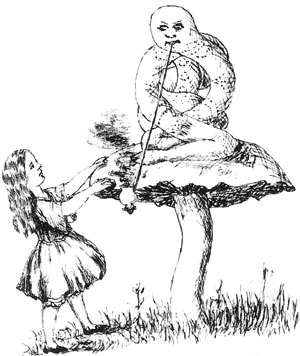
For some time they looked at each other in silence: at last the caterpillar took the hookah out of its mouth, and languidly addressed her.
"Who are you?" said the caterpillar.
This was not an encouraging opening for a conversation: Alice replied rather shyly, "I—I hardly know, sir, just at present—at least I know who I was when I got up this morning, but I think I must have been changed several times since that."
"What do you mean by that?" said the caterpillar, "explain yourself!"
"I ca'n't explain myself, I'm afraid, sir," said Alice, "because I'm not myself, you see."
"I don't see," said the caterpillar.
"I'm afraid I can't put it more clearly," Alice replied very politely, "for I ca'n't understand it myself, and really to be so many different sizes in one day is very confusing."
"It isn't," said the caterpillar.
"Well, perhaps you haven't found it so yet," said Alice, "but when you have to turn into a chrysalis, you know, and then after that into a butterfly, I should think it'll feel a little queer, don't you think so?"
"Not a bit," said the caterpillar.
"All I know is," said Alice, "it would feel queer to me."
"You!" said the caterpillar contemptuously, "who are you?"
Which brought them back again to the beginning of the conversation: Alice felt a little irritated at the caterpillar making such very short remarks, and she drew herself up and said very gravely "I think you ought to tell me who you are, first."
"Why?" said the caterpillar.
Here was another puzzling question: and as Alice had no reason ready, and the caterpillar seemed to be in a very bad temper, she turned round and walked away.
"Come back!" the caterpillar called after her, "I've something important to say!"
This sounded promising: Alice turned and came back again.
"Keep your temper," said the caterpillar.
"Is that all?" said Alice, swallowing down her anger as well as she could.
"No," said the caterpillar.
Alice thought she might as well wait, as she had nothing else to do, and perhaps after all the caterpillar might tell her something worth hearing. For some minutes it puffed away at its hookah without speaking, but at last it unfolded its arms, took the hookah out of its mouth again, and said "so you think you're changed, do you?"
"Yes, sir," said Alice, "I ca'n't remember the things I used to know—I've tried to say "How doth the little busy bee" and it came all different!"
"Try and repeat "You are old, father William"," said the caterpillar.
Alice folded her hands, and began:
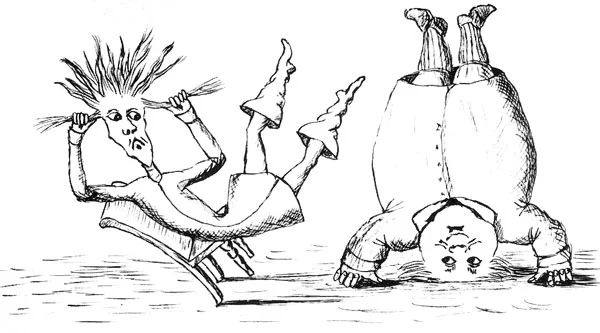
1.
"You are old, father William," the young man said, "And your hair is exceedingly white: And yet you incessantly stand on your head— Do you think, at your age, it is right?"
2.
"In my youth," father William replied to his son, "I feared it might injure the brain But now that I'm perfectly sure I have none, Why, I do it again and again."
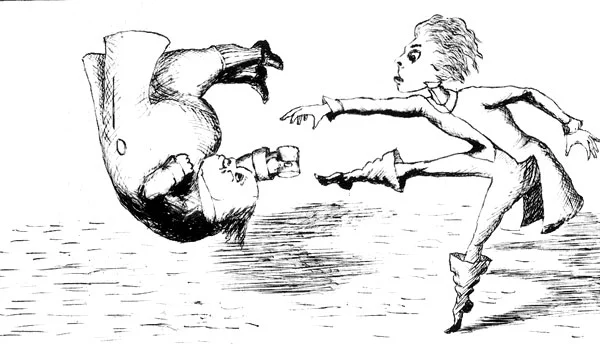
3.
"You are old," said the youth, "as I mentioned before, And have grown most uncommonly fat: Yet you turned a back-somersault in at the door— Pray what is the reason of that?"
4.
"In my youth," said the sage, as he shook his gray locks, "I kept all my limbs very supple, By the use of this ointment, five shillings the box— Allow me to sell you a couple."
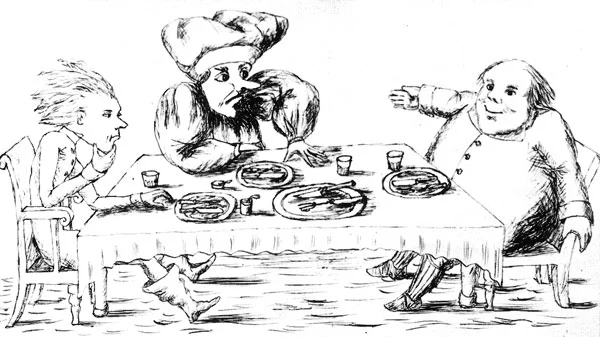
5.
"You are old," said the youth, "and your jaws are too weak For anything tougher than suet: Yet you eat all the goose, with the bones and the beak— Pray, how did you manage to do it?"
6.
"In my youth," said the old man, "I took to the law, And argued each case with my wife, And the muscular strength, which it gave to my jaw, Has lasted the rest of my life."
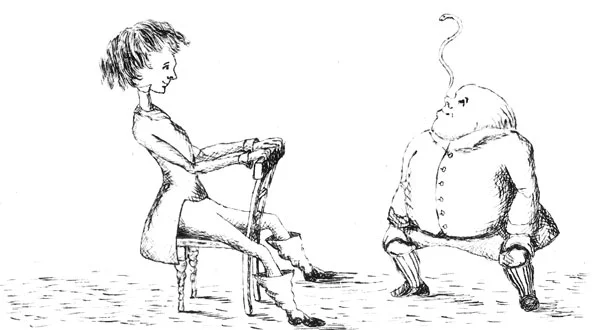
7.
"You are old," said the youth; "one would hardly suppose That your eye was as steady as ever: Yet you balanced an eel on the end of your nose— What made you so awfully clever?"
8.
"I have answered three questions, and that is enough," Said his father, "don't give yourself airs! Do you think I can listen all day to such stuff? Be off, or I'll kick you down stairs!"
"That is not said right," said the caterpillar.
"Not quite right, I'm afraid," said Alice timidly, "some of the words have got altered."
"It is wrong from beginning to end," said the caterpillar decidedly, and there was silence for some minutes: the caterpillar was the first to speak.
"What size do you want to be?" it asked.
"Oh, I'm not particular as to size," Alice hastily replied, "only one doesn't like changing so often, you know."
"Are you content now?" said the caterpillar.
"Well, I should like to be a little larger, sir, if you wouldn't mind," said Alice, "three inches is such a wretched height to be."
"It is a very good height indeed!" said the caterpillar loudly and angrily, rearing itself straight up as it spoke (it was exactly three inches high).
"But I'm not used to it!" pleaded poor Alice in a piteous tone, and she thought to herself "I wish the creatures wouldn't be so easily offended!"
"You'll get used to it in time," said the caterpillar, and it put the hookah into its mouth, and began smoking again.
This time Alice waited quietly until it chose to speak again: in a few minutes the caterpillar took the hookah out of its mouth, and got down off the mushroom, and crawled away into the grass, merely remarking as it went; "the top will make you grow taller, and the stalk will make you grow shorter."
"The top of what? the stalk of what?" thought Alice.

"Of the mushroom," said the caterpillar, just as if she had asked it aloud, and in another moment was out of sight.
Alice remained looking thoughtfully at the mushroom for a minute, and then picked it and carefully broke it in two, taking the stalk in one hand, and the top in the other.
"Which does the stalk do?" she said, and nibbled a little bit of it to try; the next moment she felt a violent blow on her chin: it had struck her foot!
She was a good deal frightened by this very sudden change, but as she did not shrink any further, and had not dropped the top of the mushroom, she did not give up hope yet. There was hardly room to open her mouth, with her chin pressing against her foot, but she did it at last, and managed to bite off a little bit of the top of the mushroom.
"Come! my head's free at last!" said Alice in a tone of delight, which changed into alarm in another moment, when she found that her shoulders were nowhere to be seen: she looked down upon an immense length of neck, which seemed to rise like a stalk out of a sea of green leaves that lay far below her.

"What can all that green stuff be?" said Alice, "and where have my shoulders got to? And oh! my poor hands! how is it I ca'n't see you?" She was moving them about as she spoke, but no result seemed to follow, except a little rustling among the leaves. Then she tried to bring her head down to her hands, and was delighted to find that her neck would bend about easily in every direction, like a serpent. She had just succeeded in bending it down in a beautiful zig-zag, and was going to dive in among the leaves, which she found to be the tops of the trees of the wood she had been wandering in, when a sharp hiss made her draw back: a large pigeon had flown into her face, and was violently beating her with its wings.
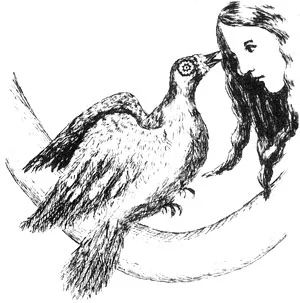
"Serpent!" screamed the pigeon.
"I'm not a serpent!" said Alice indignantly, "let me alone!"
"I've tried every way!" the pigeon said desperately, with a kind of sob: "nothing seems to suit 'em!"
"I haven't the least idea what you mean," said Alice.
"I've tried the roots of trees, and I've tried banks, and I've tried hedges," the pigeon went on without attending to her, "but them serpents! There's no pleasing 'em!"
Alice was more and more puzzled, but she thought there was no use in saying anything till the pigeon had finished.
"As if it wasn't trouble enough hatching the eggs!" said the pigeon, "without being on the look out for serpents, day and night! Why, I haven't had a wink of sleep these three weeks!"
"I'm very sorry you've been annoyed," said Alice, beginning to see its meaning.
"And just as I'd taken the highest tree in the wood," said the pigeon raising its voice to a shriek, "and was just thinking I was free of 'em at last, they must needs come down from the sky! Ugh! Serpent!"
"But I'm not a serpent," said Alice, "I'm a—I'm a—"
"Well! What are you?" said the pigeon, "I see you're trying to invent something."
"I—I'm a little girl," said Alice, rather doubtfully, as she remembered the number of changes she had gone through.
"A likely story indeed!" said the pigeon, "I've seen a good many of them in my time, but never one with such a neck as yours! No, you're a serpent, I know that well enough! I suppose you'll tell me next that you never tasted an egg!"
"I have tasted eggs, certainly," said Alice, who was a very truthful child, "but indeed I do'n't want any of yours. I do'n't like them raw."
"Well, be off, then!" said the pigeon, and settled down into its nest again. Alice crouched down among the trees, as well as she could, as her neck kept getting entangled among the branches, and several times she had to stop and untwist it. Soon she remembered the pieces of mushroom which she still held in her hands, and set to work very carefully, nibbling first at one and then at the other, and growing sometimes taller and sometimes shorter, until she had succeeded in bringing herself down to her usual size.
It was so long since she had been of the right size that it felt quite strange at first, but she got quite used to it in a minute or two, and began talking to herself as usual: "well! there's half my plan done now! How puzzling all these changes are! I'm never sure what I'm going to be, from one minute to another! However, I've got to my right size again: the next thing is, to get into that beautiful garden—how is that to be done, I wonder?"
Just as she said this, she noticed that one of the trees had a doorway leading right into it. "That's very curious!" she thought, "but everything's curious today: I may as well go in." And in she went.
Once more she found herself in the long hall, and close to the little glass table: "now, I'll manage better this time" she said to herself, and began by taking the little golden key, and unlocking the door that led into the garden. Then she set to work eating the pieces of mushroom till she was about fifteen inches high: then she walked down the little passage: and then—she found herself at last in the beautiful garden, among the bright flowerbeds and the cool fountains.
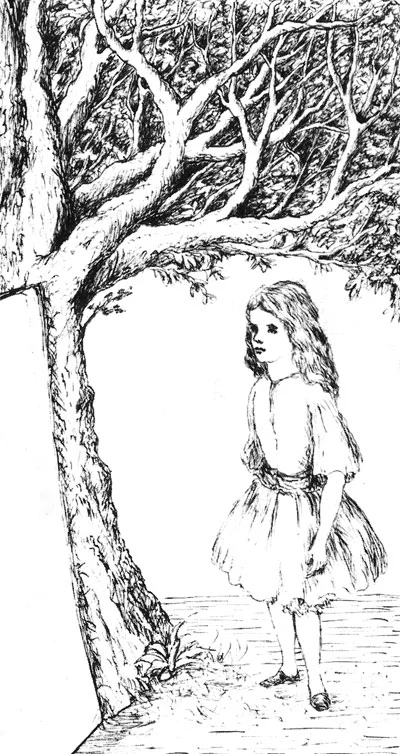

CHAPTER IV
A large rose tree stood near the entrance of the garden: the roses on it were white, but there were three gardeners at it, busily painting them red. This Alice thought a very curious thing, and she went near to watch them, and just as she came up she heard one of them say "look out, Five! Don't go splashing paint over me like that!"
"I couldn't help it," said Five in a sulky tone, "Seven jogged my elbow."
On which Seven lifted up his head and said "that's right, Five! Always lay the blame on others!"
"You'd better not talk!" said Five, "I heard the Queen say only yesterday she thought of having you beheaded!"
"What for?" said the one who had spoken first.
"That's not your business, Two!" said Seven.
"Yes, it is his business!" said Five, "and I'll tell him: it was for bringing in tulip-roots to the cook instead of potatoes."
Seven flung down his brush, and had just begun "well! Of all the unjust things—" when his eye fell upon Alice, and he stopped suddenly; the others looked round, and all of them took off their hats and bowed low.
"Would you tell me, please," said Alice timidly, "why you are painting those roses?"
Five and Seven looked at Two, but said nothing: Two began, in a low voice, "why, Miss, the fact is, this ought to have been a red rose tree, and we put a white one in by mistake, and if the Queen was to find it out, we should all have our heads cut off. So, you see, we're doing our best, before she comes, to—" At this moment Five, who had been looking anxiously across the garden called out "the Queen! the Queen!" and the three gardeners instantly threw themselves flat upon their faces. There was a sound of many footsteps, and Alice looked round, eager to see the Queen.
First came ten soldiers carrying clubs; these were all shaped like the three gardeners, flat and oblong, with their hands and feet at the corners: next the ten courtiers; these were all ornamented with diamonds, and walked two and two, as the soldiers did. After these came the Royal children: there were ten of them, and the little dears came jumping merrily along, hand in hand, in couples: they were all ornamented with hearts. Next came the guests, mostly kings and queens, among whom Alice recognised the white rabbit: it was talking in a hurried nervous manner, smiling at everything that was said, and went by without noticing her. Then followed the Knave of Hearts, carrying the King's crown on a cushion, and, last of all this grand procession, came THE KING AND QUEEN OF HEARTS.
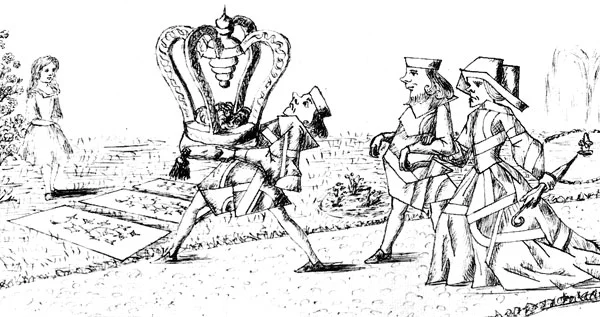
When the procession came opposite to Alice, they all stopped and looked at her, and the Queen said severely "who is this?" She said it to the Knave of Hearts, who only bowed and smiled in reply.
"Idiot!" said the Queen, turning up her nose, and asked Alice "what's your name?"
"My name is Alice, so please your Majesty," said Alice boldly, for she thought to herself "why, they're only a pack of cards! I needn't be afraid of them!"
"Who are these?" said the Queen, pointing to the three gardeners lying round the rose tree, for, as they were lying on their faces, and the pattern on their backs was the same as the rest of the pack, she could not tell whether they were gardeners, or soldiers, or courtiers, or three of her own children.
"How should I know?" said Alice, surprised at her own courage, "it's no business of mine."
The Queen turned crimson with fury, and, after glaring at her for a minute, began in a voice of thunder "off with her—"
"Nonsense!" said Alice, very loudly and decidedly, and the Queen was silent.
The King laid his hand upon her arm, and said timidly "remember, my dear! She is only a child!"
The Queen turned angrily away from him, and said to the Knave "turn them over!"
The Knave did so, very carefully, with one foot.
"Get up!" said the Queen, in a shrill loud voice, and the three gardeners instantly jumped up, and began bowing to the King, the Queen, the Royal children, and everybody else.
"Leave off that!" screamed the Queen, "you make me giddy." And then, turning to the rose tree, she went on "what have you been doing here?"
"May it please your Majesty," said Two very humbly, going down on one knee as he spoke, "we were trying—"
"I see!" said the Queen, who had meantime been examining the roses, "off with their heads!" and the procession moved on, three of the soldiers remaining behind to execute the three unfortunate gardeners, who ran to Alice for protection.
"You sha'n't be beheaded!" said Alice, and she put them into her pocket: the three soldiers marched once round her, looking for them, and then quietly marched off after the others.
"Are their heads off?" shouted the Queen.
"Their heads are gone," the soldiers shouted in reply, "if it please your Majesty!"
"That's right!" shouted the Queen, "can you play croquet?"
The soldiers were silent, and looked at Alice, as the question was evidently meant for her.
"Yes!" shouted Alice at the top of her voice.
"Come on then!" roared the Queen, and Alice joined the procession, wondering very much what would happen next.
"It's—it's a very fine day!" said a timid little voice: she was walking by the white rabbit, who was peeping anxiously into her face.
"Very," said Alice, "where's the Marchioness?"
"Hush, hush!" said the rabbit in a low voice, "she'll hear you. The Queen's the Marchioness: didn't you know that?"
"No, I didn't," said Alice, "what of?"
"Queen of Hearts," said the rabbit in a whisper, putting its mouth close to her ear, "and Marchioness of Mock Turtles."
"What are they?" said Alice, but there was no time for the answer, for they had reached the croquet-ground, and the game began instantly.
Alice thought she had never seen such a curious croquet-ground in all her life: it was all in ridges and furrows: the croquet-balls were live hedgehogs, the mallets live ostriches, and the soldiers had to double themselves up, and stand on their feet and hands, to make the arches.
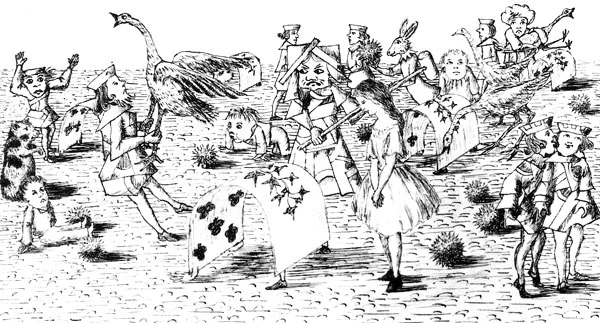
The chief difficulty which Alice found at first was to manage her ostrich: she got its body tucked away, comfortably enough, under her arm, with its legs hanging down, but generally, just as she had got its neck straightened out nicely, and was going to give a blow with its head, it would twist itself round, and look up into her face, with such a puzzled expression that she could not help bursting out laughing: and when she had got its head down, and was going to begin again, it was very confusing to find that the hedgehog had unrolled itself, and was in the act of crawling away: besides all this, there was generally a ridge or a furrow in her way, wherever she wanted to send the hedgehog to, and as the doubled-up soldiers were always getting up and walking off to other parts of the ground, Alice soon came to the conclusion that it was a very difficult game indeed.
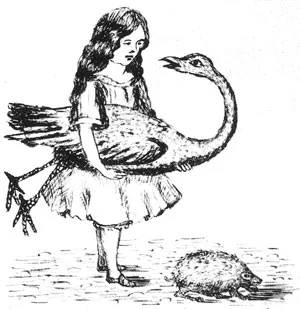
The players all played at once without waiting for turns, and quarrelled all the while at the tops of their voices, and in a very few minutes the Queen was in a furious passion, and went stamping about and shouting "off with his head!" of "off with her head!" about once in a minute. All those whom she sentenced were taken into custody by the soldiers, who of course had to leave off being arches to do this, so that, by the end of half an hour or so, there were no arches left, and all the players, except the King, the Queen, and Alice, were in custody, and under sentence of execution.
Then the Queen left off, quite out of breath, and said to Alice "have you seen the Mock Turtle?"
"No," said Alice, "I don't even know what a Mock Turtle is."
"Come on then," said the Queen, "and it shall tell you its history."
As they walked off together, Alice heard the King say in a low voice, to the company generally, "you are all pardoned."
"Come, that's a good thing!" thought Alice, who had felt quite grieved at the number of executions which the Queen had ordered.

They very soon came upon a Gryphon, which lay fast asleep in the sun: (if you don't know what a Gryphon is, look at the picture): "Up, lazy thing!" said the Queen, "and take this young lady to see the Mock Turtle, and to hear its history. I must go back and see after some executions I ordered," and she walked off, leaving Alice with the Gryphon. Alice did not quite like the look of the creature, but on the whole she thought it quite as safe to stay as to go after that savage Queen: so she waited.
The Gryphon sat up and rubbed its eyes: then it watched the Queen till she was out of sight: then it chuckled. "What fun!" said the Gryphon, half to itself, half to Alice.
"What is the fun?" said Alice.
"Why, she," said the Gryphon; "it's all her fancy, that: they never executes nobody, you know: come on!"
"Everybody says 'come on!' here," thought Alice as she walked slowly after the Gryphon; "I never was ordered about so before in all my life—never!"
They had not gone far before they saw the Mock Turtle in the distance, sitting sad and lonely on a little ledge of rock, and, as they came nearer, Alice could here it sighing as if its heart would break. She pitied it deeply: "what is its sorrow?" she asked the Gryphon, and the Gryphon answered, very nearly in the same words as before, "it's all its fancy, that: it hasn't got no sorrow, you know: come on!"
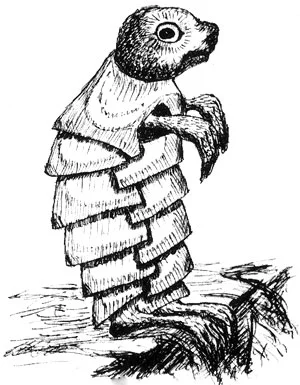
So they went up to the Mock Turtle, who looked at them with large eyes full of tears, but said nothing.
"This here young lady" said the Gryphon, "wants for to know your history, she do."
"I'll tell it," said the Mock Turtle, in a deep hollow tone, "sit down, and don't speak till I've finished."
So they sat down, and no one spoke for some minutes: Alice thought to herself "I don't see how it can ever finish, if it doesn't begin," but she waited patiently.
"Once," said the Mock Turtle at last, with a deep sigh, "I was a real Turtle."
These words were followed by a very long silence, broken only by an occasional exclamation of "hjckrrh!" from the Gryphon, and the constant heavy sobbing of the Mock Turtle. Alice was very nearly getting up and saying, "thank you, sir, for your interesting story," but she could not help thinking there must be more to come, so she sat still and said nothing.
"When we were little," the Mock Turtle went on, more calmly, though still sobbing a little now and then, "we went to school in the sea. The master was an old Turtle—we used to call him Tortoise—"
"Why did you call him Tortoise, if he wasn't one?" asked Alice.
"We called him Tortoise because he taught us," said the Mock Turtle angrily, "really you are very dull!"
"You ought to be ashamed of yourself for asking such a simple question," added the Gryphon, and then they both sat silent and looked at poor Alice, who felt ready to sink into the earth: at last the Gryphon said to the Mock Turtle, "get on, old fellow! Don't be all day!" and the Mock Turtle went on in these words:
"You may not have lived much under the sea—" ("I haven't," said Alice,) "and perhaps you were never even introduced to a lobster—" (Alice began to say "I once tasted—" but hastily checked herself, and said "no, never," instead,) "so you can have no idea what a delightful thing a Lobster Quadrille is!"
"No, indeed," said Alice, "what sort of a thing is it?"
"Why," said the Gryphon, "you form into a line along the sea shore—"
"Two lines!" cried the Mock Turtle, "seals, turtles, salmon, and so on—advance twice—"
"Each with a lobster as partner!" cried the Gryphon.
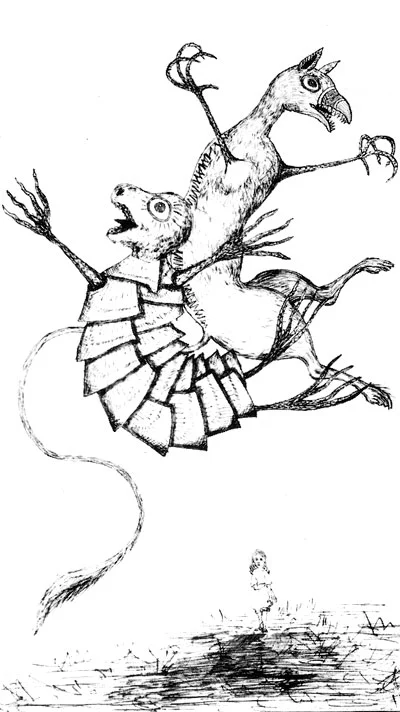
"Of course," the Mock Turtle said, "advance twice, set to partners—"
"Change lobsters, and retire in same order—" interrupted the Gryphon.
"Then, you know," continued the Mock Turtle, "you throw the—"
"The lobsters!" shouted the Gryphon, with a bound into the air.
"As far out to sea as you can—"
"Swim after them!" screamed the Gryphon.
"Turn a somersault in the sea!" cried the Mock Turtle, capering wildly about.
"Change lobsters again!" yelled the Gryphon at the top of its voice, "and then—"
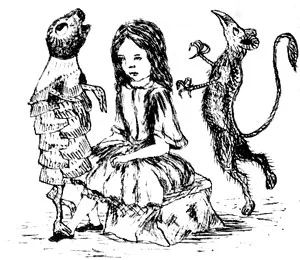
"That's all," said the Mock Turtle, suddenly dropping its voice, and the two creatures, who had been jumping about like mad things all this time, sat down again very sadly and quietly, and looked at Alice.
"It must be a very pretty dance," said Alice timidly.
"Would you like to see a little of it?" said the Mock Turtle.
"Very much indeed," said Alice.
"Come, let's try the first figure!" said the Mock Turtle to the Gryphon, "we can do it without lobsters, you know. Which shall sing?"
"Oh! you sing!" said the Gryphon, "I've forgotten the words."
So they began solemnly dancing round and round Alice, every now and then treading on her toes when they came too close, and waving their fore-paws to mark the time, while the Mock Turtle sang, slowly and sadly, these words:
"Beneath the waters of the sea Are lobsters thick as thick can be— They love to dance with you and me, My own, my gentle Salmon!"
The Gryphon joined in singing the chorus, which was:
"Salmon come up! Salmon go down! Salmon come twist your tail around! Of all the fishes of the sea There's none so good as Salmon!"
"Thank you," said Alice, feeling very glad that the figure was over.
"Shall we try the second figure?" said the Gryphon, "or would you prefer a song?"
"Oh, a song, please!" Alice replied, so eagerly, that the Gryphon said, in a rather offended tone, "hm! no accounting for tastes! Sing her 'Mock Turtle Soup', will you, old fellow!"
The Mock Turtle sighed deeply, and began, in a voice sometimes choked with sobs, to sing this:
"Beautiful Soup, so rich and green, Waiting in a hot tureen! Who for such dainties would not stoop? Soup of the evening, beautiful Soup! Soup of the evening, beautiful Soup! Beau—ootiful Soo—oop! Beau—ootiful Soo—oop! Soo—oop of the e—e—evening, Beautiful beautiful Soup!
"Chorus again!" cried the Gryphon, and the Mock Turtle had just begun to repeat it, when a cry of "the trial's beginning!" was heard in the distance.
"Come on!" cried the Gryphon, and, taking Alice by the hand, he hurried off, without waiting for the end of the song.
"What trial is it?" panted Alice as she ran, but the Gryphon only answered "come on!" and ran the faster, and more and more faintly came, borne on the breeze that followed them, the melancholy words:
"Soo—oop of the e—e—evening, Beautiful beautiful Soup!"
The King and Queen were seated on their throne when they arrived, with a great crowd assembled around them: the Knave was in custody: and before the King stood the white rabbit, with a trumpet in one hand, and a scroll of parchment in the other.
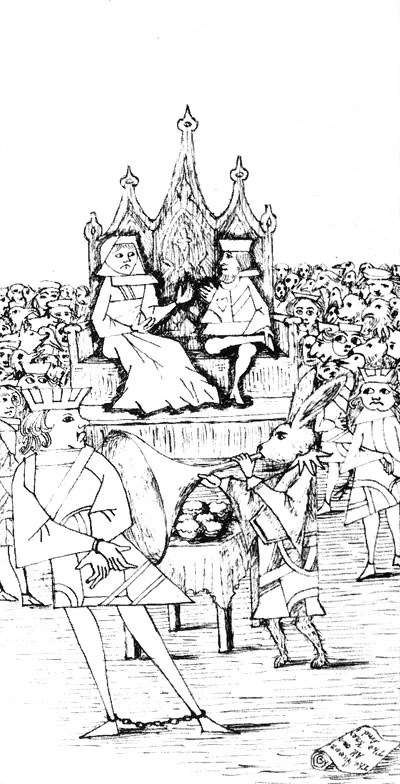
"Herald! read the accusation!" said the King.
On this the white rabbit blew three blasts on the trumpet, and then unrolled the parchment scroll, and read as follows:
"The Queen of Hearts she made some tarts All on a summer day: The Knave of Hearts he stole those tarts, And took them quite away!"
"Now for the evidence," said the King, "and then the sentence."
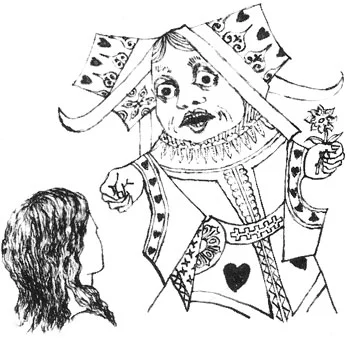
"No!" said the Queen, "first the sentence, and then the evidence!"
"Nonsense!" cried Alice, so loudly that everybody jumped, "the idea of having the sentence first!"
"Hold your tongue!" said the Queen.
"I won't!" said Alice, "you're nothing but a pack of cards! Who cares for you?"
At this the whole pack rose up into the air, and came flying down upon her: she gave a little scream of fright, and tried to beat them off, and found herself lying on the bank, with her head in the lap of her sister, who was gently brushing away some leaves that had fluttered down from the trees on to her face.
"Wake up! Alice dear!" said her sister, "what a nice long sleep you've had!"
"Oh, I've had such a curious dream!" said Alice, and she told her sister all her Adventures Under Ground, as you have read them, and when she had finished, her sister kissed her and said "it was a curious dream, dear, certainly! But now run in to your tea: it's getting late."
So Alice ran off, thinking while she ran (as well she might) what a wonderful dream it had been.
But her sister sat there some while longer, watching the setting sun, and thinking of little Alice and her Adventures, till she too began dreaming after a fashion, and this was her dream:
She saw an ancient city, and a quiet river winding near it along the plain, and up the stream went slowly gliding a boat with a merry party of children on board—she could hear their voices and laughter like music over the water—and among them was another little Alice, who sat listening with bright eager eyes to a tale that was being told, and she listened for the words of the tale, and lo! it was the dream of her own little sister.
1 comment